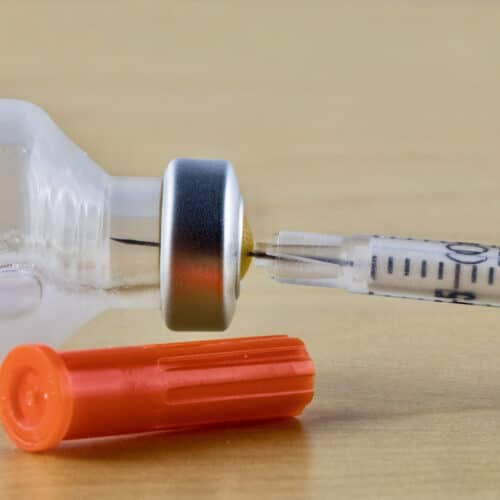Cough medicine offers hope of new treatment to slow the progression of Parkinson’s disease
10 January 2023

Following promising results reported at Phase 2 in 2020, a large-scale Phase 3 clinical trial of ambroxol, a drug currently in use to treat respiratory conditions, will start in early 2023.
The ASPro-PD trial is a world-first Phase 3 trial aimed at establishing ambroxol’s potential to slow the progression of Parkinson’s. Following eight years of work with the Parkinson’s community, driven by UK charity Cure Parkinson’s in partnership with Van Andel Institute and the John Black Charitable Foundation, this £5.5 million trial will investigate the ability of ambroxol to slow the progression of Parkinson’s.
This ground-breaking trial, led by Professor Anthony Schapira at University College London (UCL), will involve 330 people with Parkinson’s across 10-12 clinical centres in the UK. The trial is placebo controlled and participants will take the drug or placebo for two years. The effectiveness of ambroxol will be measured by its ability to slow the progression of Parkinson’s using a clinical scale including quality of life and movement. Preparations for recruitment of trial participants have already started.
Ambroxol is one of the drugs prioritised by the International Linked Clinical Trials (iLCT) programme, created and operated by Cure Parkinson’s and Van Andel Institute. The programme’s mission is to slow, stop and reverse the progression of Parkinson’s. It aims to significantly reduce the time to bring disease-modifying treatments to clinic for the Parkinson’s community by testing promising drugs that already have extensive safety data and, in some cases, have been approved by regulators for other medical conditions.
About ambroxol
Ambroxol is a medication that is commonly used in Europe as a treatment for respiratory diseases. It promotes the clearance of mucus, eases coughing and has anti-inflammatory properties.
After reviewing pre-clinical laboratory data from Professor Schapira’s group at UCL, a committee of experts brought together by Cure Parkinson’s in 2014 prioritised ambroxol for further investigation agreeing that it has the potential to slow or stop the progression of Parkinson’s. This was based on the demonstration that ambroxol could increase the removal of alpha-synuclein, a protein that builds up in Parkinson’s and is thought to be important in its cause.
Results of the Phase 2 clinical trial, which tested ambroxol in people with Parkinson’s were published in January 2020 in The Journal of the American Medical Association (JAMA) Neurology. The data showed that ambroxol was able to effectively reach the brain and increase levels of a protein known as GCase (glucocerebrosidase). GCase allows cells to remove waste proteins, including alpha-synuclein, more effectively.
In addition, the Phase 2 trial showed that ambroxol was safe for people with Parkinson’s and was well tolerated. This trial was funded and supported by Cure Parkinson’s, Van Andel Institute and the John Black Charitable Foundation.
Funding
This trial will cost £5.5 million, which is being funded by Cure Parkinson’s alongside its strategic partners, Van Andel Institute and the John Black Charitable Foundation (JBCF), and by the Parkinson’s Virtual Biotech, the drug discovery and development arm of Parkinson’s UK. Cure Parkinson’s is committing to fund £2.2 million of the total cost, with the other funders contributing £1.1 million each.
Taking part
Anyone interested in taking part in the ambroxol trial is encouraged to enrol in ‘PD Frontline’, a remote study offering online genetic testing for people with Parkinson’s. This can be done now and will help with recruiting people to the ASPro-PD trial, as well as others.
Will Cook, CEO of Cure Parkinson’s, said:
This trial is a big step forward in the search to find new treatments for Parkinson’s. Once the ambroxol trial is underway, it will be one of only six Phase 3 trials on public record of potentially disease-modifying drugs in Parkinson’s, worldwide. We at Cure Parkinson’s are working hard – through our efforts within the iLCT programme and in our fundraising efforts – to increase this number significantly in the next few years, to accelerate our progress towards a cure for Parkinson’s.”
Will Cook, CEO Cure Parkinson’s
Professor Anthony Schapira, Head of Department of Clinical and Movement Neurosciences at UCL Queen Square Institute of Neurology, University College London Hospitals NHS Foundation Trust (UCLH) and the Royal Free London NHS Hospital Trust, and the Chief Principal Investigator of ASPro-PD said:
I am delighted to be leading this exciting project. This will be the first time a drug specifically applied to a genetic cause of Parkinson’s disease has reached this level of trial, and represents ten years of extensive and detailed work in the laboratory and in a proof of principle clinical trial. The study design is the result of valuable input from people with Parkinson’s, leaders in the field of Parkinson’s, trial design and statistics from the UCL CCTU, the MHRA and a consortium of funders led by Cure Parkinson’s, all operating as an effective team to ensure we have reached this stage. We look forward to working with all these groups to ensure successful completion of the study.”
Professor Anthony Schapira, UCL Queen Square Institute of Neurology
Peter A. Jones, Ph.D., D.Sc. (hon), Chief Scientific Officer at Van Andel Institute said:
For a decade, the International Linked Clinical Trials programme has worked tirelessly to move promising potential therapies for Parkinson’s into clinical trials. Van Andel Institute is thrilled to continue partnering with Cure Parkinson’s on this vital initiative and we look forward to a bright future in which slowing or stopping disease progression isn’t a dream — it is a reality.”
Peter A. Jones, Van Andel Institute
Darren Moore, Ph.D., Chair of the Department of Neurodegenerative Science at Van Andel Institute and a member of the International Linked Clinical Trials Committee, added:
The movement of ambroxol into a Phase 3 clinical trial is a leap forward in our pursuit of treatments that slow or stop Parkinson’s progression. Ambroxol has shown promising results in a Phase 2 trial and, because it is a commonly used respiratory medication, it has already gone through rigorous safety testing. Very few potential treatments for Parkinson’s have reached Phase 3 trials, which makes today’s news that much more exciting. The trial is a testament to the power of collaboration spurred on by the International Linked Clinical Trials initiative.”
Darren Moore, Van Andel Institute
Professor David Dexter, Associate Director of Research at Parkinson’s UK said:
We’re really pleased that the Virtual Biotech is co-funding this new trial with Cure Parkinson’s and their strategic partners. People with Parkinson’s desperately need new and better treatments, and if this trial is a success, ambroxol has the potential to be available in years and not decades. The Parkinson’s Virtual Biotech is built on a foundation of international collaboration, investing in the most promising drug discovery and development projects. We know that we’ll get results for the global Parkinson’s community faster by collaborating, not competing. By working together, we can find a cure.”
Professor David Dexter, Parkinson’s UK



